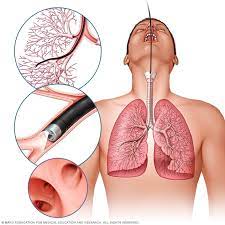BRONCHOSCOPY
A bronchoscopy is a test that allows your doctor to examine your airways. The procedure uses thin flexible
tube with camera at the tip.
During a bronchoscopy, your doctor will thread the bronchoscope through your nose or mouth and down your
throat to reach your lungs.
Why does a doctor order a bronchoscopy?
Using the bronchoscope, your doctor can view all the structures that make up your respiratory system. These
include your larynx, your trachea, and the smaller airways of your lungs, which are called the bronchi and
bronchioles.
Taking a look through the bronchoscope can help your doctor diagnose and treat any
lung-related issues you’re experiencing. Your doctor may also collect biopsies of airway secretions or
tissues to help diagnose lung and airway conditions.
A bronchoscopy can be used to diagnose:
a lung disease
a tumor
a chronic cough
an infection
The procedure can also be used to detect the source of pulmonary bleeding or identify foreign bodies in young
children.
Your doctor may order a bronchoscopy if you have an abnormal chest X-ray or CT scan that shows evidence of an
infection, a tumor, or a collapsed lung.
Treatment
The procedure is also sometimes used as a treatment tool.
A bronchoscopy can allow your doctor to deliver medication to your lungs or remove an object that’s caught in your airways, such as a piece of food. The procedure can also be used to administer laser treatment for certain small tumors.
If needed, bronchoscopy can be used to place small stents in the airways to keep them open.
